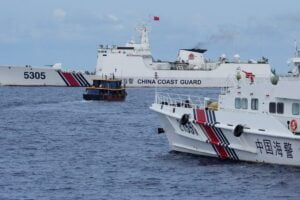When the pandemic threw low-income countries into distress in 2020, China initially appeared to be part of the solution, delivering more debt relief than any other lender to coronavirus-hit countries.
No longer. Rather than joining collective efforts to rescue distressed borrowers, its critics say China is now putting its own interests first. That not only challenges the traditional approach to sovereign defaults, but the very foundations of the IMF, World Bank and other multilateral lenders.
The full implications of China’s stance are beginning to sink in. Janet Yellen, US Treasury secretary, has made a point of bringing the issue to the meeting of G20 finance ministers in Bengaluru this week, urging Beijing to participate more fully “in meaningful debt treatments for developing countries in distress”.
Those remarks follow her visit last month to Zambia which, after defaulting on its debt in 2020, has fallen victim to a sluggish restructuring process, largely blamed by the US on Beijing.
Sri Lanka, which defaulted last year, has also not yet received the financing assurances it needs from China to finalise an IMF assistance programme.
Other countries that have borrowed heavily from Beijing and western creditors, such as Pakistan and Egypt, are at risk of following the two into default this year.
As the list of developing countries in distress grows longer, there is an overriding concern for Washington: that China will insist global lenders such as the IMF and the World Bank join bilateral and commercial creditors in reworking, or forgiving, part of their loans.
Critics claim removing so-called “preferred creditor” status would prove disastrous, raising lenders’ cost of funds — and their capacity to provide finance at much lower interest rates than borrowers could get elsewhere.
Borrowers in the developing world are also alarmed by any threat to the creditor protection that underpins the triple A credit ratings of the IMF, the World Bank and other development banks.
An internal World Bank note signed in November by executive directors representing 100 developing countries — including, bizarrely, China itself — described the bank’s triple A rating as the “very reason” why they have consistently made the lender a preferred creditor when taking out finance.
One explanation of the apparent contradiction in Beijing’s position is that there is not just one Chinese creditor. The finance, trade and foreign ministries, the central bank and the national development agency each have different and at times conflicting mandates and priorities.
This argument has been employed to explain the slow pace of China’s co-operation with debt workouts in Zambia and elsewhere. Its multiple lenders, in the form of commercial and development banks, operate under different and competing imperatives. Some observers even claim Beijing should be congratulated for what progress it has made in persuading them to act as one.
Few observers doubt there is truth to this narrative. Equally, few doubt that when the strategic or economic imperative is strong, Beijing can act decisively.
In 2017, the People’s Liberation Army opened its first overseas naval base in Djibouti, on the strait of Bab-el-Mandeb off the Horn of Africa, through which 30 per cent of the world’s shipping passes on its way to and from the Suez Canal. When Chinese loans of an estimated $1.5bn started to go wrong, there was little delay in agreeing revised terms.
“When it matters, they get it done,” said Anna Gelpern, a senior fellow at the Peterson Institute for International Economics. But, she added: “They are not invested in the existing institutions, because they were not around when they were created.”
Mark Sobel, a former US representative at the IMF, goes further. China knows “full and well” that its demands on preferred creditor status are a non-starter. But it “continues to pursue this argument as another delaying tactic to avoid taking responsibility for its own massive, unsustainable bilateral lending”.
With US-China relations at their worst in decades, there is little reason to expect this to change. China watchers think whatever Yellen says in India over the next two days may prove futile.
Yu Jie, senior research fellow for China at international affairs think-tank Chatham House, says Beijing will always pursue the best outcome for itself over collective action. “That has always been the way and it will never change.”
Source : FinancialTimes










